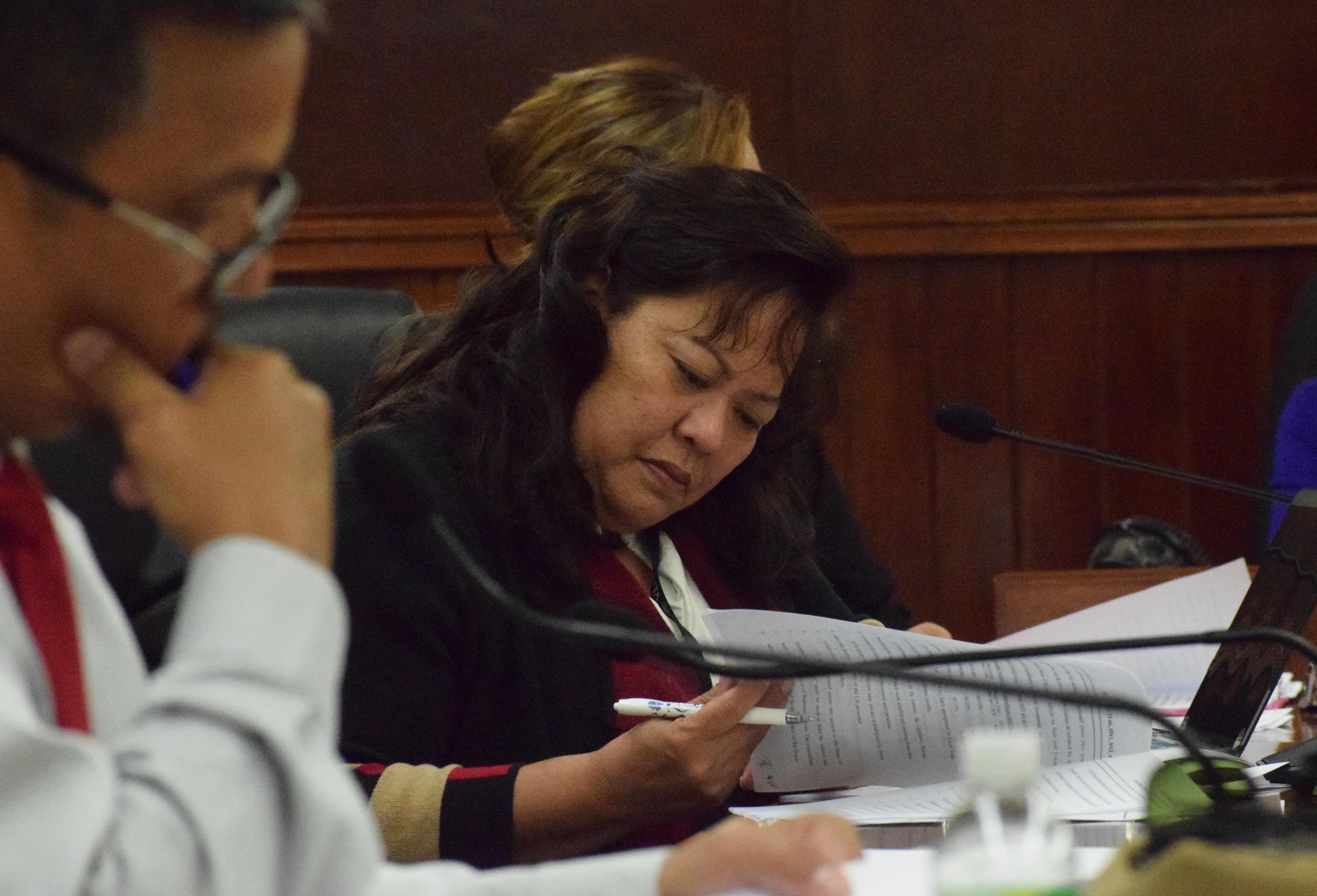
Senate President Edith Deleon Guerrero fist-bumps Sen. Jude U. Hofschneider prior to the start of an emergency session on Monday.

Sens. Jude Hofschneider and Celina Babauta review their copies of the conference committee report on the fiscal year 2024 budget during a session on Monday.
THE Senate and the House of Representatives, in separate emergency sessions on Monday, Sept. 25, passed the fiscal year 2024 budget bill, which now goes to the desk of the governor.
Without a new balanced budget enacted into law on Sept. 30, 2023, there will be a partial government shutdown.
The final version of House Bill 23-66 or the proposed FY 2024 Appropriations Act includes an austerity measure imposing a 10-hour reduction in government working hour per pay-period.
The House and Senate also agreed to pass “revenue generating” measures such as the tobacco tax increase, a sugar sweetened beverage tax, a container tax, a betel nut tax, and a construction tax.
By a vote of 19 yes with one abstention, the House at 10 a.m. on Monday adopted the bicameral conference committee report recommending the passage of its substitute version of H.B. 23-66, which would appropriate $114.2 million for government personnel and operation in the next fiscal year.
Rep. Thomas J. Manglona, who, despite a tragic event in his family, took time to attend the emergency session, said he understands the urgency of passing a new budget.
But he abstained because he could not make a clear decision on something that he did not adequately review “with everything that has happened this past few weeks in my personal life.”
Speaker Edmund S. Villagomez thanked him for “still making the time to be here despite everything that you have been going through. Just know that you and your family are still in our prayers.”
House Ways and Means Committee Chairman Ralph N. Yumul said the bicameral conference committee met in the last four days and agreed to fund the offices of the Tinian and Saipan mayors provided that revenue-generating bills were also approved by both houses.
He said among the most contentious parts of the bill was Schedule A or the budget spreadsheet for the executive, legislative and judicial branches, which “took a lot of time to deliberate.” Yumul said.
Because of limited time, they couldn’t use the House’s more detailed version “so we agreed with the Senate version of Schedule A.”
He urged his colleagues to pass the conference committee’s version of the budget bill “so we can avoid a government shutdown.”
Rep. Blas Jonathan Attao said “we are pretty satisfied that there was a lot of revenue-generating measures that have been presented by the House, some of them are sitting in the Senate already and are going to see the light of day, so we can get them to governor’s desk.”
Unfortunate
After the Senate unanimously passed the budget during its emergency session at 3 p.m., Senate President Edith Deleon Guerrero of Saipan said “it is quite unfortunate that the government employees have to face the cuts as a result of the lack of revenue.”
She said she is hopeful that the Legislature will start looking at “revenue-generating legislation” in a timely fashion.
They also need to look at economic initiatives and an action plan from the administration, she added.
She said there are “conversations about pivoting to military tourism,” but “we have yet to see any revenue studies being done for this particular industry as we speak today.”
The U.S. military buildup has been happening in the region already, “but we have yet to see an official report on how much revenue has been generated from [military] tourism and how much revenue has been collected as a result of the military buildup, which is right next door, and what is the spill-over for Rota and Saipan as well.”
The Senate president said the Legislature may also want to find ways to improve the CNMI as a tourist destination by working with the Marianas Visitors Authority and other stakeholders “so that we can become a much more competitive market.”
“All of these things are the responsibilities of the government. Collectively, it is our responsibility. It is just…quite unfortunate that our working population, the government employees, have to bear the brunt of the reduction of hours in order for us fill the gap for certain programs that are lacking revenue,” she said.
Rota Sen. Dennis Mendiola, for his part, expressed concern about the 100% reprogramming power for the governor. “One of the things we really [should] avoid is giving one entity the authority to reprogram funds because of the probability of short-changing departments and other agencies.”
Tinian Sen. Karl King-Nabors, who is a member of the conference committee, echoed Mendiola’s concern. But he said “there was great care that was put into the process.” He said concessions have to be made by both sides in order for the conference committee to address all of the government’s needs throughout the CNMI.
“And I think that is an important part to shine the light on — that we endeavored to fulfill and fund as many activities that are mandated under the government. So it wasn’t an easy task,” he said.
King-Nabors at the same time thanked the Senate president “for allowing the voice of all senatorial districts to be heard and fulfill their mandate…which is to provide for the whole of the CNMI.”









